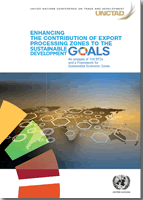
This exploratory report suggests that changes taking place in the global market mean that Export Processing Zones (EPZs), and Special Economic Zones (SEZs) more generally, can be restructured as centres of excellence for sustainable development. Such restructuring would increase the appeal of EPZs to multinational enterprises (MNEs) and their suppliers, while simultaneously contributing to the implementation of the Sustainable Development Goals (SDGs), also known as 'Global Goals'.
The report argues:
-
EPZs face a strategic challenge as traditional tax incentives for attracting companies into zones become incompatible with international trade law and exemptions for developing countries expire.
-
EPZs can enhance competitiveness through a 'role reversal': switching from a narrow focus on cost advantages and lower standards to become champions of sustainable business. EPZs can find new grounds for competitiveness through meeting the growing expectations on MNEs and their suppliers to exercise good social and environmental practices. "Next generation" EPZs can gain a competitive advantage by not only providing conventional commercial benefits (such as modern infrastructure and expedited permitting), but by also providing cost-effective support for good environmental and social practices for firms operating within their boundaries.
-
Although some EPZs are making the transition to more of a sustainable development orientation (demonstrating proof of concept), an UNCTAD survey of 100 EPZs' public information undertaken as part of this report suggests that most EPZs are not promoting prominent environmental and social features. Given changes to conventional means of attracting investment into EPZs, this lack of engagement with corporate sustainability could become a missed opportunity for both sustainable development and for EPZ investment promotion.
Sustainability related business features promoted by EPZ (number of EPZs)

Key elements for promoting sustainable EPZs

-
EPZ management agencies can develop services to help firms' cost-effective compliance with international Corporate Social Responsibility (CSR) standards, including provision of training and monitoring, as well as health, safety and waste management services to enable a circular economy.
-
Governments and investment promotion strategies should promote competitiveness through enabling efficient performance on all issues that matter to business success, including economic, social and environmental issues, rather than exempting zones from their own national laws on labour practices or the environment. They could require zones to promote economic linkages with their wider economies of host countries and assess progress towards that aim.
-
EPZs operating as centres of excellence for sustainable development could act as pilot projects. Lessons learned from these "Sustainable Economic Zones" could be applied and scaled up by developing country governments at a regional and national level. This can be part of the development of backward and forward linkages to the wider economy so that zones are catalysts of wider development. In that way, EPZs could play a catalytic role in helping nations achieve, inter alia, SDG 8, on employment and decent work, 9, on sustainable production, and 12, on sustainable industrialization.
-
A 'Framework for Sustainable Economic Zones' is offered to guide consideration of EPZ standards, infrastructure and administrative assistance to enhance sustainability performance.




